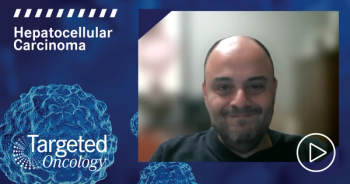
Targeted Therapies in Oncology
- October 1, 2020
- Volume 9
- Issue 13
COVID-19 Pandemic Delays Treatment for HCC, Says French Cancer Center Analysis
In patients with advanced hepatocellular carcinoma treated in 2020, there was an observed decrease in planned treatment as well as significant delays noted as a result of the coronavirus disease 2019 pandemic, according to the results of a study of 6 academic referral centers.
In patients with advanced hepatocellular carcinoma (HCC) treated in 2020, there was an observed decrease in planned treatment as well as significant delays noted as a result of the coronavirus disease 2019 (COVID-19) pandemic, according to the results of a study of 6 academic referral centers in Paris, France.1
“Patients with cancer represent a vulnerable population due to acquired immunodeficiency and are at increased risk of COVID-19–related serious events,” Giuliana Amaddeo, MD, PhD, said during her presentation at the International Liver Cancer Association 2020 Virtual Conference. “According to the EASL [European Association for the Study of the Liver] guidelines,2 management and care of patients affected by HCC should be maintained even with minimal exposure to medical staff, but little evidence exists describing the impact of COVID-19 infection and [the] natural history of management of HCC.”
Amaddeo and colleagues performed a retrospective, cross-sectional analysis to determine the impact of the pandemic on the management of patients affected by HCC in the metropolitan area of Paris. Trial end points were the number of patients with a change in their treatment strategy and the delay between multidisciplinary tumor board (MTB) decision and when treatment was eventually carried out. The study included patients with HCC who received treatment during the inclusions period and had a proposal of treatment in an MTB meeting or had a programmed surgical or radiological procedure. The COVID-19–exposed group was evaluated from March 6 through April 17, 2020; the same dates applied to the cohort of patients included in the 2019 control group.
In total, 670 patients were included in the analysis in either the 2019 control group (n = 377) or the 2020 COVID- 19–exposed group (n = 293). Baseline characteristics for the 2 groups were balanced, with a majority of patients being male with a median age of 67 years. The median tumor burden was 30 mm in both cohorts.
“The absolute number of patients affected by HCC...was lower in the COVID-19 period as compared with 2019,” said Amaddeo, who is assistant chief resident at CHU Henri-Mondor in Créteil, France. The rate of treatment was 56.7% in the 2019 group versus 43.7% in the group treated in 2020, with a more significant decrease occurring during the second part of the pandemic (P = .018). In 2019, the rate of treatment plans unrealized was 0.8%; in 2020, the rate was 5.3% (P < .001).
Delays from MTB to treatment initiation lasting longer than 1 month occurred in 9.5% of patients in the 2019 cohort and 21.5% of those in 2020 (P < .001); in the subgroup with active, recurrent disease, corresponding rates of delay were 4.7% and 23.3% (P < .001). According to Amaddeo, the reasons for delay varied by study period. In the 2019 group, treatment-related delays were the leading cause in 48.4% of patients, followed by delays due to materials (27.2%) or patient-related factors (24.2%). In the 2020 group, COVID- 19–related issues accounted for 77.0% of treatment delays, followed by treatment-related factors (11.4%), delays due to materials (5.0%), and patient factors (6.5%) (FIGURE).1
In the 2019 group, the leading cause of changing treatment was disease progression in 65.3% of patients, followed by failed or contraindicated treatment (26.5%) and patient choice (8.1%). COVID-19–related issues were the leading cause of treatment modification in the 2020 group, followed by disease progression (23.1%), failed or contraindicated treatment (10.2%), and patient choice (20.5%).
Noting these results, Amaddeo said there were “no differences observed in terms of distribution; treatment intent of [curative, palliative, or supportive care]; or class of treatment, [ie, interventional, noninterventional, or best supportive care].”
Based on univariate analysis, there was a significant association between delay or change in treatment strategy and those patients treated in 2020 compared with 2019 (odds ratio [OR], 9.661; 95% CI, 2.85-32.72; P < .001), and similar associations were observed by multivariate analysis (adjusted [a]OR, 9.323; 95% CI, 2.74-31.69; P < .001).
“When focusing on variables associated with treatment delay longer than 1 month, the period and type of treatment proposed were found to be significantly [associated with this outcome],” said Amaddeo. Interventional therapy was a significant predictor of delay by both univariate (OR, 9.518; 95% CI, 3.44-26.36; P < .001) and multivariate analysis (aOR, 9.585; 95% CI, 4.00-26.69; P = .065).
“The study found during the COVID-19 period a decrease in the number of patients with HCC who presented to a multidisciplinary tumor board, [the] number of patients with first diagnosis of HCC, and planned or programmed treatment,” said Amaddeo. “Modification of treatment strategy and delay longer than 1 month were related to COVID- 19 infection in the cohort.”
References:
1. Amaddeo G. A multicenter, cross-section study of the impact of COVID-19 pandemic on the management of hepatocellular carcinoma in a high-prevalence French area. Presented at: International Liver Cancer Association 2020 Virtual Conference; September 11-13, 2020.
2. Boettler T, Newsome PN, Mondelli MU, et al. Care of patients with liver disease during the COVID-19 pandemic: EASL-ESCMID position paper. JHEP Rep. 2020;2(3):100113. doi:10.1016/j.jhepr.2020.100113
Articles in this issue
over 5 years ago
Guidelines for MCL Set to Change Due to COVID-19over 5 years ago
New Therapies in Development for Myelofibrosisover 5 years ago
Special Considerations Accompany Newer Agents in R/R B-Cell ALL



















